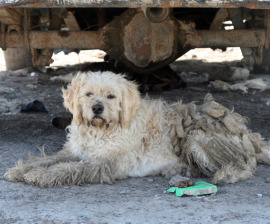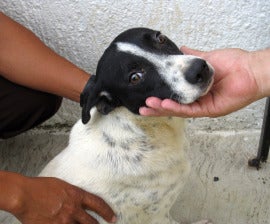-

A quiet place to rest. HSI
-

Wary. Darren Mower/istock
-

Matted fur. Milan Klusacek/istock
-

Being assessed for treatment. HSI
-

Touching noses, St. Maarten. Carly Ikuma/HSI
-

Adopt me! Trinidad & Tobago. HSI
-

Street dogs lead a difficult life. Grigory Bibikov/istock
Every nation across Latin America and the Caribbean is at a different stage of development when it comes to street dog welfare. Whether the animals are exposed to the drought of the Sonora desert or to the freezing temperatures of the Patagonian winter, countries have their own opinions about and approaches to addressing this issue.
Some governments recognize that street dogs are their responsibility, and they collaborate with local animal welfare organizations to bring about change. Others kill street dogs indiscriminately because, they say, there is no leadership and no initiative for finding a solution to their overpopulation of strays.
In some cases, action seems to spring from desperation. If people complain about health and security issues relating to the overwhelming number of street dogs, or if there is a rabies outbreak, dogs will be culled or taken to a municipal shelter to await the death penalty by electrocution, edible poison, or an injected cocktail of badly mixed drugs that will cause excruciating pain before the end finally comes.
Animal control issues
HSI collaborates with local groups to monitor attempts at stray overpopulation control. Together, we offer alternatives to mass poisoning and other traditional but inhumane methods such as electrocution or use of the archaic gas chamber.
In most cases, officials respond with relief upon learning that there are humane approaches to the problem. Having one or multiple organizations step up as leaders and present a solution that prevents cruelty to animals has also changed many a community’s perception of street dogs as a nuisance. Humane education, responsible guardianship, and spay/neuter campaigns have helped to reshape animal welfare in Latin America and the Caribbean.
What we’re doing
As part of pursuing a more humane means of animal control, HSI strongly supports spay/neuter campaigns across the region. We organize veterinary trainings and capacity-building workshops to strengthen and encourage the work that is done at a governmental level and by the non-profit sector—for example, by training government-appointed veterinarians as well as those who, through a sense of social responsibility and understanding of the importance of collaboration, support the efforts of local organizations.
Enhancing veterinary skills is the best way to prevent unnecessary animal suffering. Now that Latin American and Caribbean countries are slowly turning towards a spay/neuter approach, HSI is striving to ensure that the local vets supporting the efforts of animal welfare groups are properly trained and comfortable in their surgical skills.
Addressing the problem of unwanted litters in low-income communities is also key to our efforts and we will continue to provide responsible owners with the opportunity to sterilize their pets.
HSI collaborates with various local partner organizations on a regular basis and we have become a source of guidance, support and information for many along the way.
We will continue to support the efforts of local groups to help animals, in particular companion animals who roam the streets, in hopes of offering them a brighter future.
